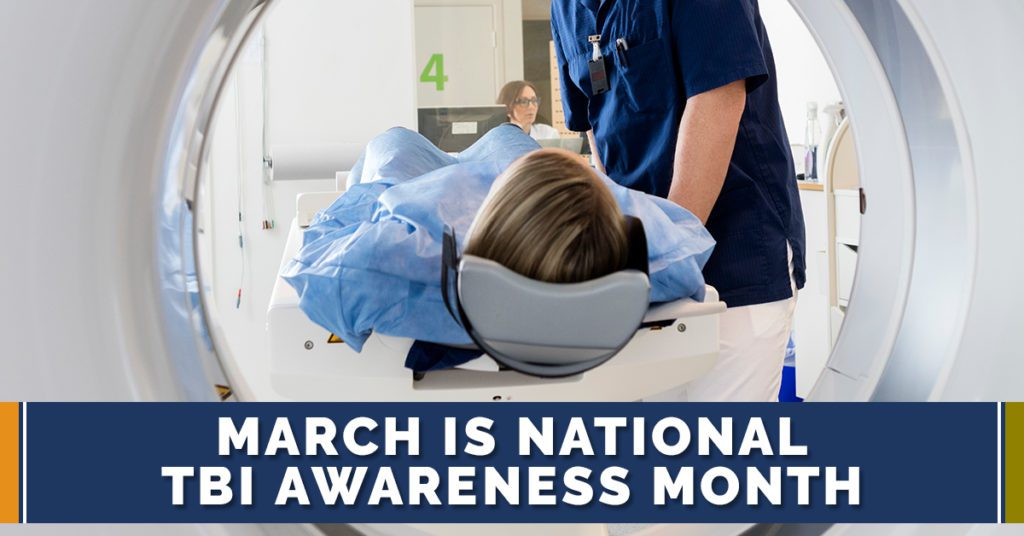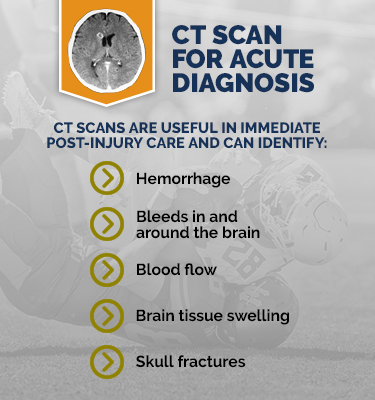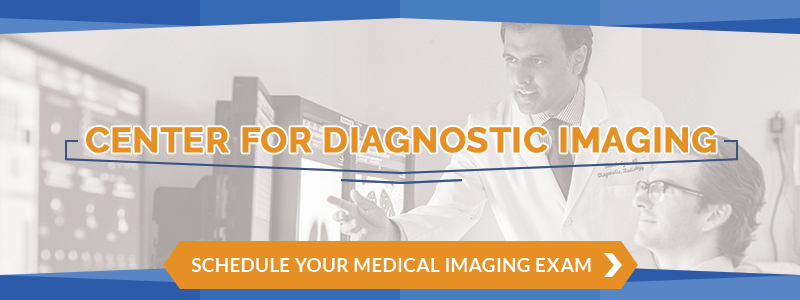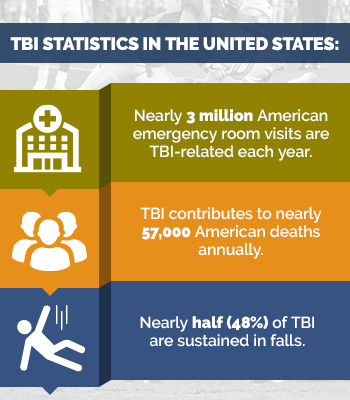 In recent years, more attention has been paid to the significance of concussions (mTBI) and traumatic brain injuries (TBI). What was once thought as a minor happenstance has been discovered to potentially cause much bigger issues. While many people associate concussions and TBI with football players and military service members, TBIs can be sustained by anybody. Studies revealed that more than 57,000 American deaths annually can be attributed to traumatic brain injuries caused by falls, blows to the head, vehicle accidents, and other head traumas. While a single mild concussion may not be a big deal and symptoms can easily resolve with rest and proper care, repeat concussions may result in memory impairment, personality and behavioral changes, mental health problems, headaches, difficulty concentrating, and vision and hearing changes. To help bring awareness to the real concern and potential consequences of concussion and TBI, March is designated as National TBI Awareness Month.
In recent years, more attention has been paid to the significance of concussions (mTBI) and traumatic brain injuries (TBI). What was once thought as a minor happenstance has been discovered to potentially cause much bigger issues. While many people associate concussions and TBI with football players and military service members, TBIs can be sustained by anybody. Studies revealed that more than 57,000 American deaths annually can be attributed to traumatic brain injuries caused by falls, blows to the head, vehicle accidents, and other head traumas. While a single mild concussion may not be a big deal and symptoms can easily resolve with rest and proper care, repeat concussions may result in memory impairment, personality and behavioral changes, mental health problems, headaches, difficulty concentrating, and vision and hearing changes. To help bring awareness to the real concern and potential consequences of concussion and TBI, March is designated as National TBI Awareness Month.
At Touchstone Imaging, we offer a variety of specialized studies of the brain, including CT scans, MRI, and MRI with NeuroQuant® technology. If you have suffered a blow to the head or a fall that resulted in loss of consciousness, or you have had repeated head traumas, medical imaging procedures may help in the identification and treatment of your TBI. Contact the Touchstone Imaging Center near you to schedule your appointment today. Join us in today’s post as we discuss the dangers of TBI and why March is designated to bring awareness to this important topic. We will also discuss some of the ways that medical imaging technology can help change the outcome of your head trauma.
Understanding The Danger of Repeat Concussion and TBI
While the brain is arguably the most important organ in our bodies, it was not until recently that we understood just how the brain works. Amazingly enough, scientists and neurologists are still not 100% certain of all the internal workings of our brains. However, with advancements in technology — namely brain mapping and medical imaging capabilities — our knowledge has exponentially increased over the last decade. We now have a much better understanding of the roles of nerves and neurons, and what the specific areas of the brain control. Perhaps more importantly, we now also have a much better understanding of how trauma, nutrition, and environmental factors impact brain health and brain function. Much like a stroke, traumatic brain injuries cause damage to brain cells.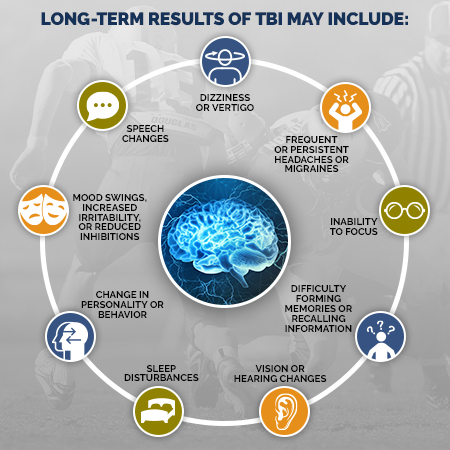
A mild concussion (mTBI), or one that occurs without the loss of consciousness or persistent symptoms, the long-term effects are generally mild, if they exist at all. The recommended recovery includes brain rest that includes limiting stimulation, challenging thinking, fatigue states, and reducing light and noise. With proper rest, the brain should recover with no lasting symptoms. For those traumatic brain injuries that result in loss of consciousness or external damage, it is a good idea to have diagnostic imaging to determine the extent of the internal damage.
Studies have shown that the damage caused by mTBI and TBI may result in brain atrophy, which is a contributing factor for the development of Alzheimer’s disease. Mental health problems, including depression, addiction, and suicide, seem to be common trends among those with repeat concussions or TBI. Additionally, anger, rage, and irritability may increase, as well as logical reasoning may decrease. This may lead to episodes of violence, and in some extreme cases, homicide and/or suicide.
How Medical Imaging Can Help
Medical imaging, including CT scans and brain MRI, play an important role in the detection of injury and guiding provider treatment of a TBI. Being able to clearly visualize what part of the brain is injured and to what severity can help improve treatment plans and outcomes to give those who have suffered a brain injury their best fighting chance and returning to their normal self.
 CT Scan
CT Scan
Computed tomography (CT) scan is used in the acute phase following a traumatic head injury to visualize active bleeds and identify life-threatening problems. These CT scans also serve as a baseline for immediate post-injury care and can be used to compare subsequent follow-up imaging scans. CT scans are quick and offer a complete picture of the head and brain
CT scans use a series of cross-sectional x-rays that are compiled to create a three-dimensional image of the head and brain. A CT scan is effective at detecting bleeding within and around the brain, blood flow, swelling, and breaks in skin and bone.
At Touchstone Imaging Centers, most of our imaging facilities across the nation have CT scanners to assist our patients. If you need a non-emergent CT scan for a brain eval, find a Touchstone location near you, and schedule your appointment today.
Brain MRI
MRI is a powerful medical imaging tool that provides a full three-dimensional image of the brain. Using powerful magnetic waves, it can detect variations in tissues. Brain MRIs can be used as follow-up tools or as baseline diagnostic tests.
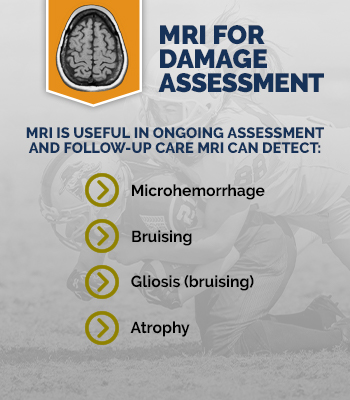 MRI of the brain can detect microhemorrhage — very small bleeds — bruising, scarring, atrophy, and communication between brain cells. Some of these details may not be revealed on a CT scan, which is why it is useful in a traumatic head injury to have a CT at the acute phase to address life-threatening injuries and then an MRI to search for the finer details that may be affecting your brain.
MRI of the brain can detect microhemorrhage — very small bleeds — bruising, scarring, atrophy, and communication between brain cells. Some of these details may not be revealed on a CT scan, which is why it is useful in a traumatic head injury to have a CT at the acute phase to address life-threatening injuries and then an MRI to search for the finer details that may be affecting your brain.
Advanced NeuroQuant® software harnesses the information provided by a brain MRI to measure the brain and compare it to baseline information. This helps determine if there is any brain atrophy and to what extent. This can be particularly useful for those who have sustained multiple concussions or head trauma.
At Touchstone Imaging Centers, nearly all of our locations offer MRI services, and we have the NeuroQuant® technology at several of our locations. If you have suffered mTBI or TBI, find a Touchstone location near you, and schedule your appointment today.
At Touchstone Imaging Centers, our skilled imaging technologists and experienced radiologists offer the diagnostic imaging services you need and the accuracy you can count on. We know that your imaging scans are more than just pictures; they are a tool used in the planning and implementation of your care. We acknowledge that your health and wellness are dependent on the care you receive, and we help ensure it is based on high-quality images and accurate interpretations. If you need medical imaging services for your head or brain, visit us online to find a Touchstone location near you, and schedule your appointment today.
Visit these online resources for more information:
Traumatic Brain Injuries — What Medical Imaging Reveals
Traumatic Brain Injury and Alzheimer’s Disease: The Cerebrovascular Link

